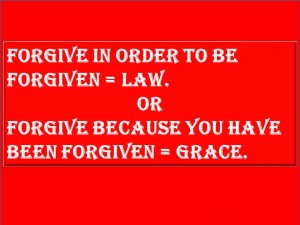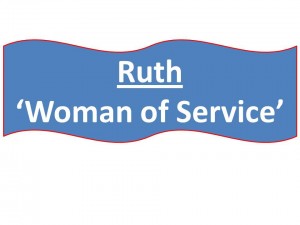Archive for November 2012
Matt 6:14-15
“For if you forgive men their trespasses, your heavenly Father will also forgive you. But if you do not forgive men their trespasses, neither will your Father forgive your trespasses.” (NKJV)
Does the above scripture seem harsh to you? Why would Jesus say such a thing? What happens if we fail to fulfill the conditions?
For a true understanding of this scripture we must understand the difference between Old Covenant (OC) forgiveness and New Covenant (NC) forgiveness.
Under the OC the law was conditional, that is, if a person obeyed the word, they came under a blessing. If they disobeyed the word, they came under a curse. Hence they would be judged guilty, condemned and a punishment meted out.
This led to a sense of anguish, fear, hopelessness, and worst of all rejection.
Isa 59:2. But the trouble is that your sins have cut you off from God. Because of sin He has turned His face away from you and will not listen anymore. (TLB)
Whereas, under the NC of grace, forgiveness was unconditional. Why? Because on the cross, Jesus became our substitute sacrifice and took upon Himself the punishment of the sins of the world, past, present and future. Therefor when we invite Christ into our lives, He forgives all our sins.
Col 2:13 And you, being dead in your trespasses and the uncircumcision of your flesh, He has made alive together with Him, having forgiven you all trespasses. (NKJV)
Also, His sacrifice was a once for all sacrifice, never to be repeated again.
Heb 9:26-27 But now, once at the end of the ages, He has appeared to put away sin by the sacrifice of Himself. (NKJV)
Hence, whenever we sin, we know that the blood of Christ has washed that sin away and our role is to simply receive the Father’s forgiveness.
This leads to a sense of peace, joy, rest and best of all, acceptance not rejection from God.
Therefore we can now answer the question regarding Jesus statement about forgiveness. Jesus was still operating under the law when He spoke those words. The NC didn’t come into being until Jesus died on the cross because He Himself was the covenant: “This is my body which is broken for you. This is my blood which is shed for you.”
Forgiveness now undergoes a major change. Instead of, ‘You must forgive in order to be forgiven’, it now becomes, ‘Forgive because you have been forgiven.’
This revelation brings two freedoms:
1) If we are struggling to forgive someone and keep falling back into unforgiveness - we know that God’s forgiveness still stands, therefore we no longer have to come under condemnation, guilt and rejection. This gives us the hope and strength to get back up and get back into the forgiveness process.
2) When we are 100% convinced that we are forgiven by God, this revelation imparts to us a grace to forgive others. This is what Paul the Apostle means when he says in Col 3:13 Bear with each other and forgive whatever grievances you may have against one another. Forgive as the Lord forgave (past tense) you. (NIV)
Meditation Point: God has forgiven all my sin, therefore I never have to feel condemned and guilty when I sin. I no longer have to avoid coming to God because I think He has rejected me. NO Even when I struggle with sin or I’m defeated or feel a failure. I can now come to God in boldness, knowing He accepts me as I am and loves me unconditionally.
No tags
(READ RUTH CH’s 1-4)
Point 3: Sit Still My Daughter
When Ruth returns from collecting wheat in the fields, Naomi asks her which field she has been in.
Ruth 2:19 Then Ruth told her mother-in-law about the one at whose place she had been working. “The name of the man I worked with today is Boaz.” (NIV)
Naomi then proceeds to tell Ruth that Boaz is their Kinsman Redeemer. In Israel, when a married man died, the law said that his brother (his next of kin) was to marry and take care of his wife and children, pay off any debts that had incurred and bring them into his own family. This ensured that the land and property of the deceased man stayed in the family and tribe of his name.
If his brother was not able to do this, the nearest next of kin who was able took on this responsibility and redeemed (bought back from debt) this woman and her children.
Naomi then instructs Ruth what to do. She is to approach Boaz and say to him, “Spread the corner of your garment over me, since you are a kinsman-redeemer.” (Ru 3:9. NIV)
In Israel, when a man married a woman, he threw his outer garment over the head of his wife, thus publicly proclaiming he was now responsible for his wife and future family, to provide and take care of them.
Boaz responded to Ruth’s request by telling her that there was another next of kin closer than him, but if he wouldn’t marry her, Boaz would.
When Naomi hears Boaz’s response, she says to Ruth, “Sit still, my daughter, until you know how the matter will turn out; for the man will not rest until he has concluded the matter this day.” (Ru 3:18. NKJV)
Sure enough, Boaz goes through the process of contacting the man who is the nearest of kin to see if he wishes to redeem Naomi’s property and marry Ruth so as to keep them in the tribal territory. Eventually the man says he is not able to, leaving Boaz free to become the Kinsman Redeemer.
Boaz now purchases Naomi’s property and land and marries Ruth.
When we apply this principle to ourselves, we see that Boaz is a picture of Christ our heavenly Bridegroom and Ruth a picture of the Bride of Christ. Thus Christ as our Kinsmen Redeemer has thrown His garment over us, publicly proclaiming that He is responsible to protect, care and provide for us.
Hence, whenever we have a need, problem or difficulty we cannot resolve by our own means or strength, our response is to give it to our heavenly Boaz and like Ruth we are to sit still until He meets that need, resolves that problem, sorts out that difficulty.
Sitting in scripture speaks of rest. We are to give our needs to Jesus and rest in Him until He answers our prayer.
Sitting still speaks of inward rest, free from all anxiety, worry and fear; And Like Boaz, Jesus will not rest until He has resolved the matter.
Here’s the rub: when we rest – He works. When we work – He rests. Therefore if we give our problems to Jesus but take them back again and begin to worry – He stops working on our behalf and rests.
This is why Heb 4:11 says, “Let us labour (make every effort) therefore to enter into that rest.” (KJV)
This is an oxy-moron*. How can we work to enter His rest. The answer is that we have to work at giving and leaving our needs with Jesus by being focused on Him, putting our trust in Him and not on our need.
The Amplified Bible says, Heb 12:2 “Looking away from all that distracts.” As we continue to look away from our problem and look at Him, gaze upon Him and behold Him, our heart comes into rest, joy and peace.
Meditation Point: Matt 11:28-30. “Are you tired? Worn out? Burned out on religion? Come to me. Get away with me and you’ll recover your life. I’ll show you how to take a real rest. Walk with me and work with me — watch how I do it. Learn the unforced rhythms of grace. I won’t lay anything heavy or ill-fitting on you. Keep company with me and you’ll learn to live freely and lightly.” (THE MESSAGE)
* Oxy-moron: A figure of speech by which a locution produces an incongruous, seemingly self-contradictory effect, as in “cruel kindness” or “to make haste slowly.”
No tags



